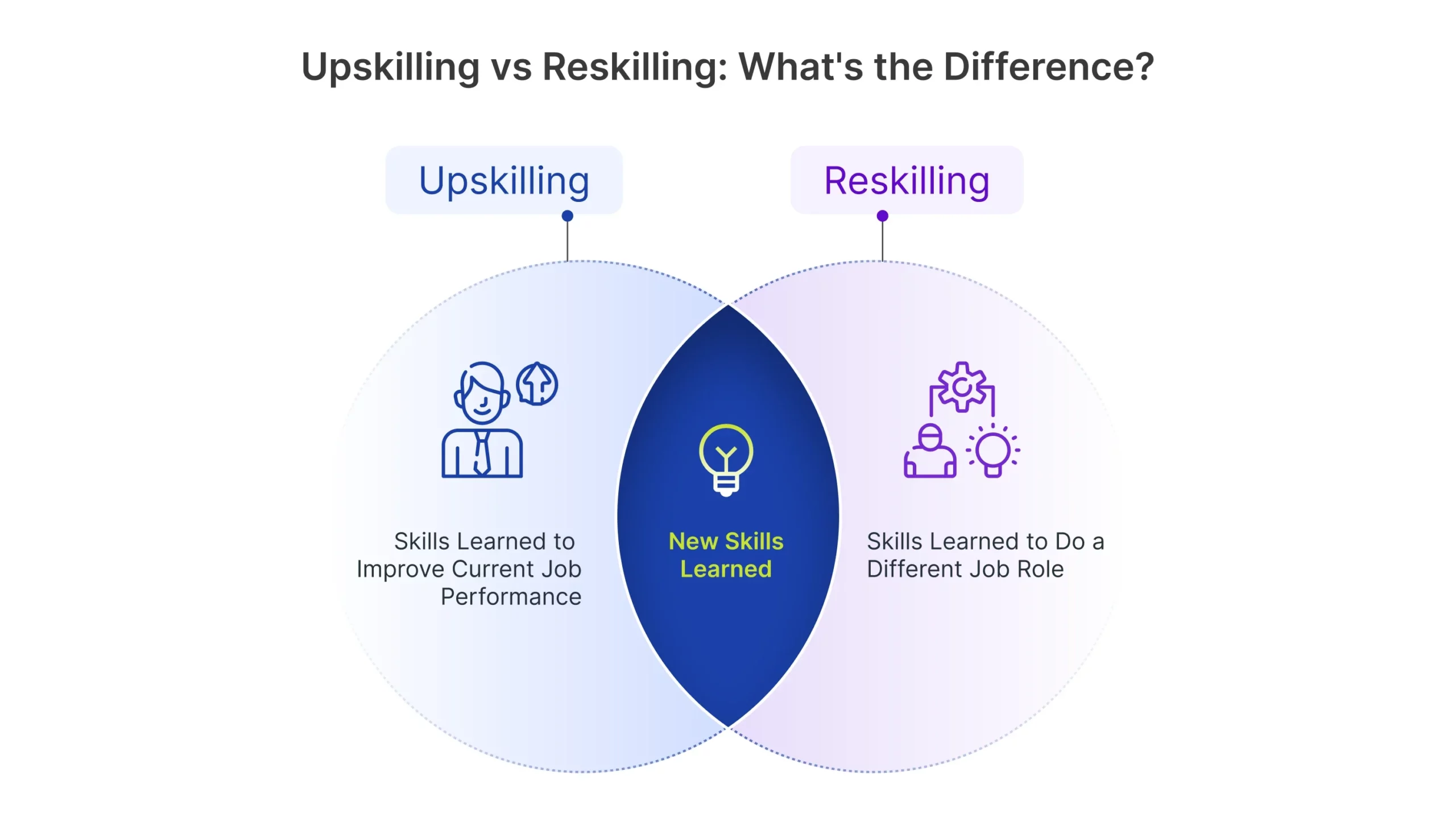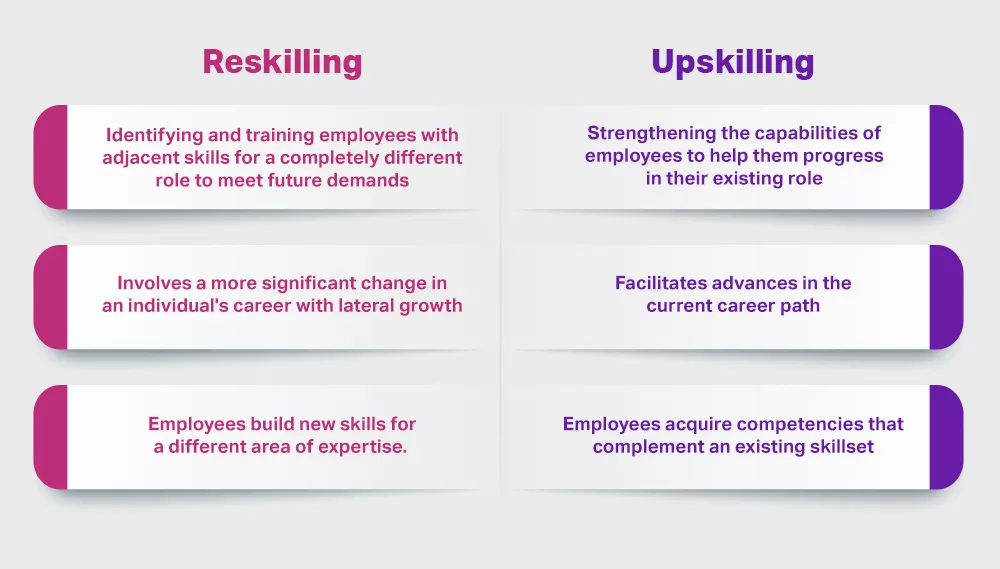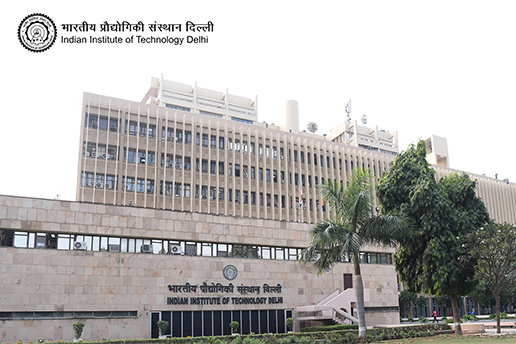Upskilling and Reskilling: Shaping the Future of the Workplace
Table of Contents

Hey there! Suppose you are an employee navigating a complicated job market, a leader trying to build a workforce, or a business owner trying to remain competitive. In that case, you are in the right place. We are going to discuss two transformational ideas – upskilling and reskilling. Both concepts of upskilling and reskilling are not just buzzwords but part of the fabric of success in the modern workplace.
So, what is the concern? The job marketplace is evolving at an incredible pace! Advances in technology and changes in industries mean that while some roles fade into the past, others emerge at the forefront with entirely different skill sets. Hence, we must prepare ourselves by skilling and reskilling. Upskilling refers to the abilities we develop related to our jobs. Reskilling involves acquiring new abilities needed for a different job. This is crucial if we want to be successful.
What can you expect to learn in this blog? Let’s take a look at the importance of these concepts, their differences from one another, and their benefits to individuals and organizations. By the end of the blog, you will understand that upskilling and reskilling are not an easy choice but a necessity for the current workforce. Are you ready to discover how to shape your future? Let’s get started!
The Importance of Upskilling and Reskilling
With change as the only constant, the need for upskilling and reskilling has never been stronger. Industries and automation continuously adapt to changes in technology, and consequently, the skills the workforce requires to be successful in various roles are also changing. Studies show nearly 70% of employees feel they will need to learn new skills to stay at the top in this competitive workforce. This statistic necessarily shows the need for both individuals and organizations to emphasize continuous learning. Here are a few reasons that explain the importance of upskilling and reskilling:
1. Adapting to Change:
What we’ve been saying is true -the work environment is not the same as it was 20 years ago. New technologies in automation and artificial intelligence are changing traditional industries, and a lot of traditional jobs are disappearing. For instance, Manufacturing is being replaced in more and more cases with automated assembly processes. Thus, upskilling allows employees to maintain their relevance in the future by improving their existing skills, while reskilling ensures they can take on entirely new roles. In this ever-changing environment, flexibility will be essential for survival.
2. Fostering Innovation:
A workforce equipped with the latest skills is more capable of thinking creatively and driving innovation. When employees engage in lifelong learning, they provide a fresh perspective and outlook. Furthermore, organizations that focus on their workforce’s development are often at the forefront of trends, rather than being left behind. For example, tech companies that support employees in their pursuit of developing expertise in new technologies will have a better chance of implementing a new solution than their competition.
3. Enhancing Job Security:
In today’s unpredictable job market, flexibility is crucial. Professionals who acknowledge the idea of lifelong learning are ahead of their peers at the moment their careers change. Professionals with diverse skill sets can adapt more easily and are less susceptible to being let go. Employees who do not accept and adapt to the change may end up being left behind as the job market grows and changes.
4. Building a Growth Culture:
Organizations that promote a culture of continuous learning do not just retain their existing talent but also attract top candidates. Employees want to stay with an organization that invests in their personal and professional development. A growth-oriented culture creates loyalty and motivators for employees to actively engage in the company’s success.
Understanding the Difference: Upskilling vs. Reskilling
While upskilling and reskilling are often used interchangeably, they address different needs:
- Upskilling aims to strengthen employees’ existing skill sets. For instance, a software developer may train in a new programming language to strengthen their coding skills. In this way, employees begin to deepen their skill set in their existing role and create more value in that role.
- Reskilling, on the other hand, means learning entirely new skills for an entirely new role. For example, a marketing professional may change roles to a data analyst position and learn to analyze data. Reskilling is particularly key for career changers or when a new job requires new skills.

*edstellar.com
Understanding the difference between reskilling and upskilling is crucial for both employees and employers seeking to implement effective training programs.
The Benefits of Upskilling and Reskilling
Now that we’ve set the stage, let’s delve into the tangible benefits of upskilling and reskilling for individuals and organizations alike.
For Individuals
1. Increased Job Security:
Nowadays, those with a diverse skill set are more likely to remain employed. Upskilling and reskilling equip you with the tools to navigate shifts in the job market confidently. When new technologies emerge, you’ll be prepared to adapt and thrive. If you want to calculate the return on your upskilling investments, Jaro Education can help you, as we have India’s first AI-powered Upskilling ROI calculator.
2. Higher Earning Potential:
Having in-demand skills can help you receive promotions and salary increases because employers are willing to pay for someone who can increase their value to their organization with their skillset. For example, if you learned to use a new software tool that increases your efficiency, you would be a better prospect for higher salaries and jobs.
3. Greater Job Satisfaction:
Learning new competencies can change your career. It disrupts the heaviness of routine work and accomplishes the psychological benefit of accomplishment in the main feature of labor. A spark of learning in your career can reignite your passion in your area and provide you with a meaningful work life.
4. Mental Well-being:
Upskilling and reskilling not only keep your skills sharp but also challenges your mind. This can lead to increased confidence and a sense of fulfillment in your career. The act of setting and achieving learning goals boosts your self-esteem and contributes to overall happiness.

*https://disprz.ai
For Organizations
1. Improved Productivity:
Employees who receive training can work more efficiently. Upskilling and reskilling lead to better performance, which directly impacts the bottom line. Companies that prioritize employee development often see a noticeable increase in productivity and morale.
2. Enhanced Innovation:
A workforce that is continually learning is better equipped to think creatively. This innovation can drive your company ahead of competitors who are slower to adapt. Organizations that embrace a culture of learning are often the ones leading in market trends.
3. Increased Employee Engagement:
Investing in your employees’ growth fosters loyalty. When workers feel valued and challenged, they are more engaged, leading to higher retention rates. Engaged employees are more likely to go above and beyond in their roles, contributing to a positive workplace culture.
4. Attracting Top Talent:
Companies that prioritize skill development become magnets for high-quality candidates. Talented individuals are actively seeking organizations that offer growth opportunities. By showcasing your commitment to employee development, you enhance your employer brand and attract the best talent in the market.
Conclusion: The Future is Bright with Upskilling and Reskilling
As we wrap up our exploration of upskilling and reskilling, it’s clear that these concepts are not just trends; they are essential practices for thriving in today’s workplace. Investing in upskilling is crucial for career advancement. Jaro Education offers a unique opportunity to quantify this investment with India’s first AI-powered Upskilling ROI Calculator. Using our tool, you can see the financial benefits of upskilling, enabling you to make informed decisions about your educational investments. Additionally, our calculator offers insights into how targeted programs can significantly enhance your earning potential and career trajectory.
So, are you ready to invest in your future? The future is bright, and it’s time to step into it with confidence!
Frequently Asked Questions
What are upskilling and reskilling?
Upskilling involves enhancing employees’ existing skills to improve their effectiveness in their current roles. In contrast, reskilling equips them with new abilities for different or emerging positions within the organization.
Can you provide examples of upskilling and reskilling?
Upskilling focuses on deepening current skills. For instance, a marketing specialist might learn advanced data analytics to excel further in their role. Reskilling, however, pertains to acquiring entirely new skills to shift career paths, like a retail manager transitioning into digital marketing by learning relevant new competencies.
What does upskilling mean in the workplace?
In the workplace, upskilling refers to training initiatives that enhance employees’ abilities and address skill gaps. This approach aims to help current employees advance in their careers and explore various opportunities within the organization.
What are the benefits of upskilling?
Upskilling empowers employees to maximize their potential and discover new avenues for growth within the organization. By improving their skills, employees become more adept at meeting and surpassing management’s expectations.
















